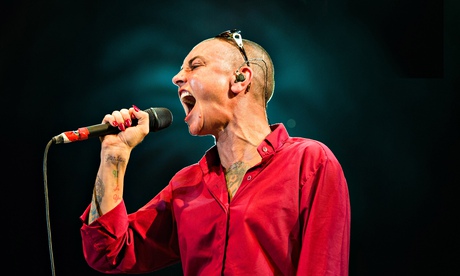
The first-ever capacity crowd at Charlton Park, glorious weather, and a lineup ranging from Indian dance to Sinéad O'Connor. This was a classic Womad, and the most unexpectedly successful, emotional performance came from a band featuring three women in furry stovepipe hats. DakhaBrakha are from Ukraine and matched edgy, eerie harmony vocals with concertina, cello and percussion work, in an exhilarating set that seemed to sum up their country's chaos and hope. They veered from moody and atmospheric passages to a furious, exuberant percussive finale in which they waved Ukrainian flags, looking bemused at the delighted reaction they had caused.
The reunion of Les Ambassadeurs was also an emotional affair. One of Africa's most celebrated bands, they started out playing in a Bamako motel in the early 1970s, over a decade before the west discovered the extraordinary vocal powers of the band's then-singer Salif Keita. Now he came on dressed in an ill-fitting black suit, flanked by such celebrated former colleagues as Amadou Bagayoko, who became a star with Amadou and Mariam.Salif was in glorious form, but stepped back to allow reminders that keyboard player Idrissa Soumaoro is also a fine singer. The only disappointment was the lack of a brass section and their failure to include their best-known song Mandjou. It was to have been the encore, but they overran.
Another of Africa's finest singers, Youssou N'Dour, was introduced with the excited announcement "he's a minister now". Thankfully, his political career in Senegal hasn't damaged his musical enthusiasm. His voice was as fluid, powerful and distinctive as ever, driven on by talking drums in a powerful tribute to Mandela or a glorious treatment of Birima. From younger African musicians, the best set came from Fatoumata Diawara, collaborating with the Cuban jazz pianist Roberto Fonseca. She was in confident, powerful voice, and her songs, such as Clandestin, were transformed by Fonseca's furious, often spectacular playing on piano and organ, adding a pounding riff and then a swirling jazz solo.
Elsewhere, Kobo Town updated the Trinidadian calypso tradition by adding in hip-hop energy, switching from old songs by Lord Kitchener to the thoughtful, new and apocalyptic Tick Tock Goes the Clock. Then there were experimental folk projects, with a quietly original the Gloaming matching finely played and sung Irish themes against the drifting piano work of Thomas Bartlett, while from Wales 9Bach matched cool female vocals against harp, guitar, electronics and a pounding rhythm section.
Better still was the exceptional set from British guitarist and banjo player Martin Simpson and Dom Flemons, of Carolina Chocolate Drops fame. Their mutual love of American blues and ragtime produced an assured, gutsy revival.
The final headliner on the Open Air stage was Sinéad O'Connor, a perhaps unlikely replacement for the late Bobby Womack. Womad encourages eclectic taste, and she attracted an impressive crowd for a thoughtful, gutsy performance that included Take Me to Church and No Man's Woman. Finally Zimbabwean guitar hero Oliver Mtukudzi arrived – several hours late – to play on the BBC Radio 3 Charlie Gillett stage, allowing a veteran African to close an exceptional festival.
• This article was amended on 30 July 2014 because an editing error led to an earlier version referring to DakhaBrakha being "a band of three women in furry stovepipe hats". DakhaBrakha has four members, and the writer's original text has been restored.

